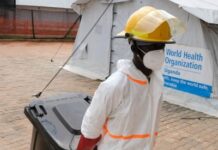DRC gained independence in 1960 and since then the UN has played a crucial role in the country, notably through the deployment of three peacekeeping missions.
A member of MONUC’s South African parachute battalion on patrol duties around the village of Ntamugenga. (file)
4. Natural resources: A major factor in conflicts
DRC benefits from immense natural resources, particularly in the three eastern provinces, including vast reserves of gold, diamonds and tin, which is used in electronic devices.
North and South Kivu are also rich in coltan, a metal highly coveted by the technology sector because of its use in the manufacture of capacitors found in mobile phones and laptops. DRC is also the world’s leading producer of cobalt, a strategic mineral used in the manufacture of almost all rechargeable batteries in the world today.
These natural resources attract interests in neighbouring countries and are at the heart of conflicts in the region.
Armed groups, such as M23, are accused of illegally exploiting these resources to finance their activities, with the complicity of companies inside and outside the country as well as DRC’s neighbours.
The UN has put in place several initiatives to combat the illegal trade in minerals, including mechanisms to sanction companies involved in this trafficking and an arms embargo to combat their proliferation in DRC.
However, combating illegal exploitation of resources remains a major challenge.





























